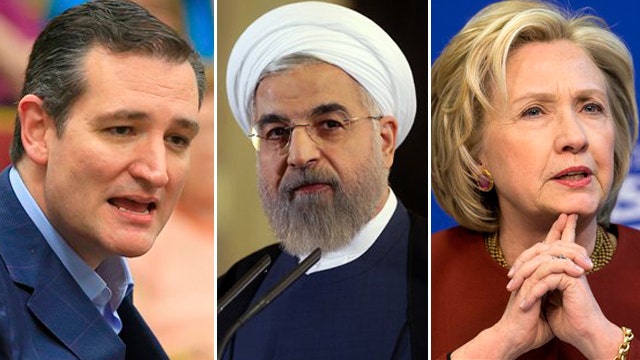Eric Shawn reports: The Iran deal's political fallout
Republicans and Democrats square off for 2016
Israeli Prime Minister Benjamin Netanyahu urged the U.S. and other world powers to seek a firmer deal with Iran Sunday over that country's nuclear program and said that he’s "not trying to kill any deal,” just a “bad deal.”
"I think the alternatives are not either this bad deal or war. I think there's a third alternative. And that is standing firm, ratcheting up the pressure, until you get a better deal," the Israeli Prime Minister told CNN's "State of the Union". "A better deal would roll back Iran's vast nuclear infrastructure and require Iran to stop its aggression in the region, its terror worldwide, and its calls and actions to annihilate the state of Israel."
On Thursday, the United States and five other world powers reached agreement with Iranian officials on the framework of a deal to limit Tehran’s nuclear enrichment program. The deadline for a final agreement is June 30.
The deal aims to cut significantly into Iran's bomb-making technology while giving Tehran relief from international sanctions. The commitments, if implemented, would substantially pare down Iranian nuclear assets for a decade and restrict others for an additional five years.
On Sunday, the Associated Press reported that it had obtained a document drawn up by experts in Netanyahu's office that gives a glimpse of the arguments the Israeli leader plans to raise, targeting vague language in the system of inspections and its failure to address issues beyond the nuclear program.
Appearing on NBC's "Meet the Press," Netanyahu said the agreement outline "could be a historic bad deal because it leaves the preeminent terrorist state of our time a vast nuclear infrastructure ... Thousands of centrifuges will be left, not a singular facility, including underground facilities will be shut down."
Netanyahu added that the framework leaves Iran with “the capacity to produce material for many nuclear bombs.”
On ABC's "This Week", Netanyahu also warned that a deal could “spark a nuclear arms race among the Sunni countries in the Middle East.”
On CNN’s “State of the Union,” Netanyahu said “restrictions placed on Iran are temporary, after a few years, Iran will have unlimited access.”
According to a U.S. document summarizing last week's agreement, Tehran is ready to reduce its number of centrifuges, the machines that can spin uranium gas to levels used in nuclear warheads, and submit to aggressive monitoring and inspections of its nuclear facilities.
But the Israeli analysis claims the system of inspections is not as thorough as proclaimed because it does not explicitly force the Iranians to open their sites "anywhere, anytime."
It also claims the agreement is vague about what happens to Iran's stockpile of enriched uranium, a key ingredient in producing nuclear bombs, or how sanctions might be re-imposed if Iran violates the deal.
While Iran is not supposed to enrich uranium with its advanced centrifuges for 10 years, the deal permits limited "research and development" of the advanced centrifuges, according to the U.S. document. Israeli officials say this means that Iran could immediately put these centrifuges into action after the deal expires or breaks down.
Netanyahu said Sunday that Iran has “cheated in the past on this, in this case, with this deal, what’s been illegitimate is being legitimized not only the ability to maintain but in a few years to increase it, that’s very dangerous.”
However, President Obama staunchly defended the framework of the nuclear agreement with Iran as a “once-in-a-lifetime opportunity” to prevent a bomb and bring longer-term stability to the Middle East.
"It's been a hard period," Obama said in an interview with New York Times columnist Thomas Friedman published Sunday. He added that it is "personally difficult" for him to hear his administration accused of not looking out for Israel's interests.
He insisted the U.S. would stand by Israel if it were to come under attack, but acknowledged that his pursuit of diplomacy with Tehran has caused strain with the close ally.
Obama argued that successful negotiations presented the most effective way to keep Iran from obtaining a nuclear weapon, but insisted he would keep all options on the table if Tehran were to violate the terms.
"I've been very clear that Iran will not get a nuclear weapon on my watch, and I think they should understand that we mean it," Obama said. "But I say that hoping that we can conclude this diplomatic arrangement — and that it ushers a new era in U.S.-Iranian relations — and, just as importantly, over time, a new era in Iranian relations with its neighbors."
Obama said there are many details that still need to be worked out with the Iranians and cautioned that there would be "real political difficulties" in implementing an agreement in both countries. He reiterated his opposition to a legislation that would give the U.S. Congress final say in approving or rejecting a deal, but said he hoped to find a path to allow Congress to "express itself."
The White House plans an aggressive campaign to sell the deal to Congress, as well as to Israel and skeptical Arab allies who worry about Iran's destabilizing activity in the region. The president has invited leaders of six Gulf nations to Washington this spring and said he wanted to "formalize" U.S. assistance.
The Associated Press contributed to this report.








































